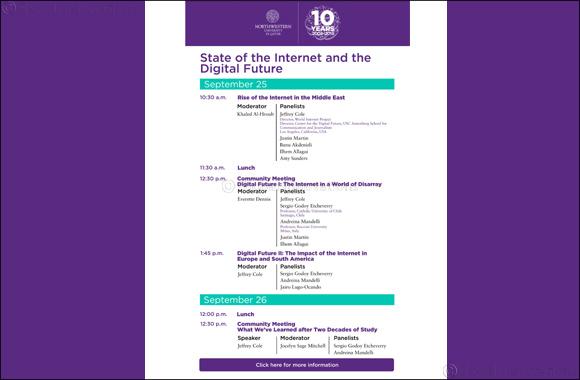
Media Scholars to Discuss Digitization and State of the Internet at NU-Q
- In terms of internet penetration, Qataris have one of the highest internet use rates of any country in the world (saturation at 95 percent).
- Qatar has unique social media use patterns. Among all Qataris, 93 percent use Whatsapp, 70 percent use Instagram, and 64 percent use Snapchat. The latter two figures are among the highest penetration rates in the world for those two platforms.
- Qataris spend the most time face-to-face with family each week despite increased time spent online. Qataris now say they spend on average of 43.2 hours a week with family and 44.5 online.
- Compared to 2015, Qataris are far less willing to pay for news content—in 2017, 71 percent said they are unwilling to do so, compared with only 24 percent in 2015. Qataris are least likely to express willingness to pay for news content.
- Trust amongst Qataris in mass media has decreased. Nearly one-third of Qatari nationals say they do not trust mass media, more than double those who expressed this view in 2015.
- Declining numbers of Qataris believe people benefit from getting news from foreign news media – a decrease from 56 percent in 2015 to 33 percent in 2017.
- At the same time, belief that international news organizations are biased against the Arab World has doubled between 2015 and 2017, from 7 percent to 13 percent.
- Qataris’ belief that more should be done to preserve cultural traditions dropped from 94 percent in 2014 to 81 percent in 2016.
- Qatari nationals are now less likely to identify as culturally conservative. A decrease from 75 percent in 2015 to 41 percent in 2017.
Home >> Education and Learning Section
Al Meera and Al Rayan Bank launch the "I am not made of plastic" initi ...
IATA Comments on Misguided Solidarity Levy Proposal
Mercato Wows Visitors with Circus Spectacles, Iconic Slide, and Weekly Cash Priz ...
Msheireb Properties Wins “Best Luxury Residential Development” and “Best Luxury ...
GTA: To date, exemptions exceeding QAR 900 million for more than 4,000 taxpayers ...
B-lounge doha celebrates the summer season with an enticing new b-lunch set menu
G-SHOCK's Summer Style Statement: Metal-Cased Watches That Define the Season
Msheireb Museums Unveils 2025 Summer Programme: Encouraging Creative Expression ...
MEEZA Signs Agreement with a Global Hyper-scaler to Utilize the Under-Constructi ...
Education Above All Foundation and Inter- American Development Bank Launch $100 ...
Keeta Sets Stage for Qatar Market Entry with Exclusive Founding Vendor Program f ...
Passenger Growth Hits 5% in May
Nasser Bin Khaled Automobiles Hosts Private Screening of 'F1: The Movie' In coll ...
May Air Cargo Demand Up 2.2% Despite Trade Disruptions
Qatar Insurance Group Earns MSCI's Highest ESG Rating, Cementing Its Leadership ...
Zulal wellness resort partners with qatar airways privilege club to offer exclu ...
Education Above All Foundation Announces New Collaboration with the American Cha ...
Auto Class Cars Launches its Special Summer offer on Maxus D60 and D90 max SUVs
Qatar Automobiles Company – FUSO: Driving Progress Across Industries in Qatar
Dukhan Bank Ranks #62 on Forbes Middle East's Top 100 Listed Companies for 2025


